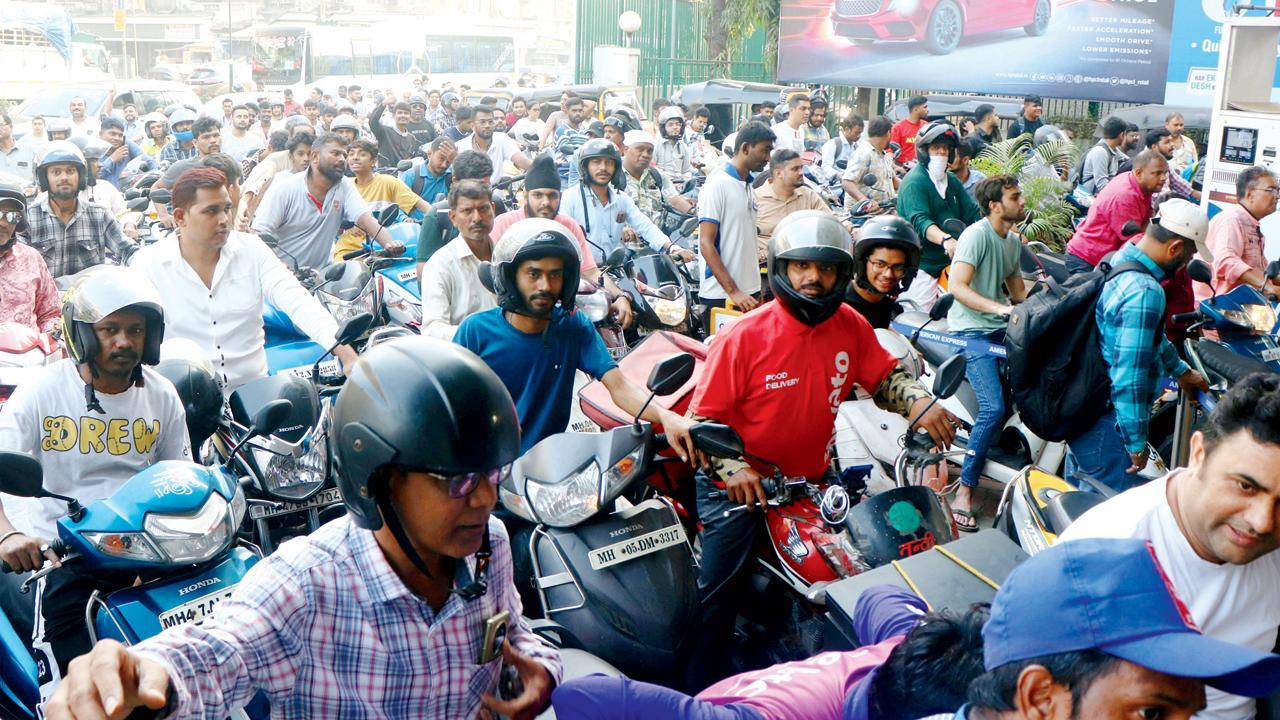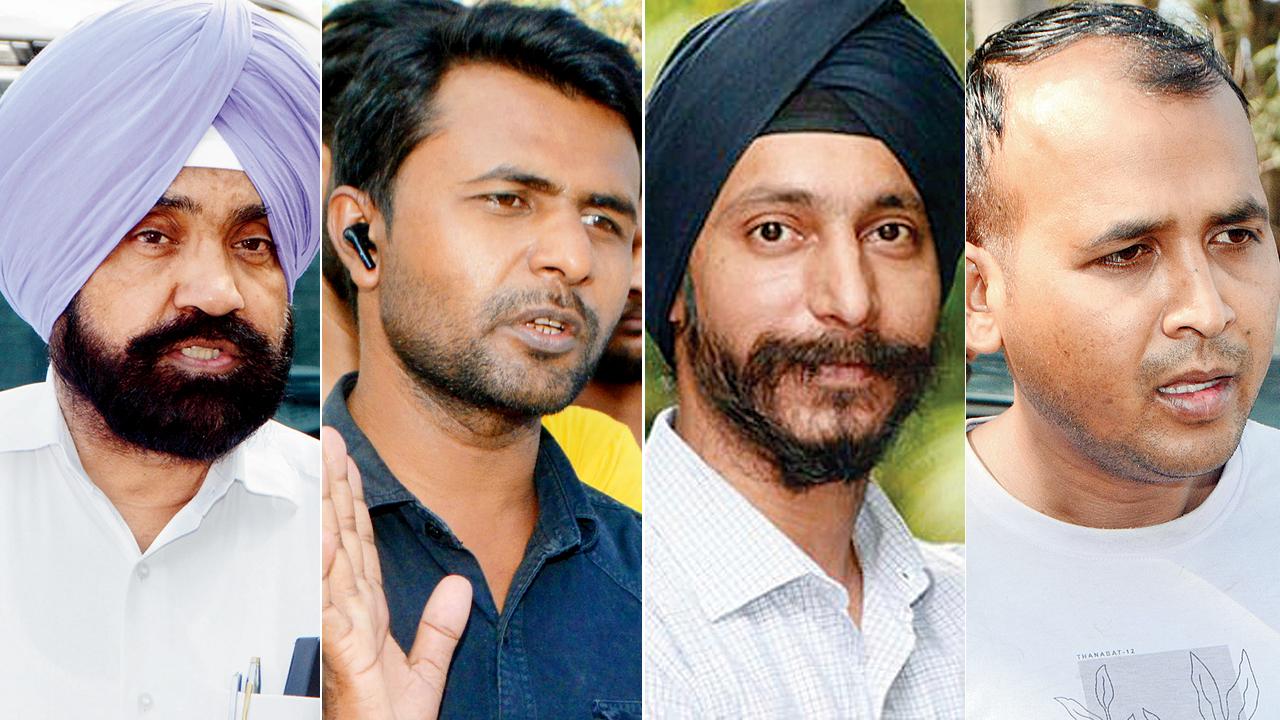A two-day strike earned India’s truck drivers the ‘anti-national’ tag. But the men who ferry our essential goods, mid-day finds, are simply trying to survive on a road riddled with challenges

The three-day strike by truck drivers against the proposed new law for hit-and-run accidents left the city in chaos. Many rushed to petrol pumps to top off their fuel tanks, for fear of the supply drying out. Pic/Anurag Ahire
The Wadala Truck Terminal is a 288-acre hangout for long-haul truck drivers travelling to and from the city. We see a group of them sitting around, swapping stories, inside jokes and high-fives, relief written all over their faces. And for good reason.
On January 1, it was announced that under the new Bharatiya Nyay Sanhita, all motorists found guilty in hit-and-run accidents will be jailed for 10 years and made to pay a penalty of Rs 7 lakh. After a three-day long strike that crippled the city, they relented on Wednesday, when the government announced that it would defer the laws implementation.
Javed Khan, 33, comes from Farrukhabad, a small city that sits on the banks of the Ganga, 300 km away from the national capital. Khan has 10 years of experience as a truck driver and is the most talkative among his group of peers. “It’s good and bad. I guess it depends on your nazariya,” he says about his life on the road. Every eight hours, Khan and his co-workers gather around their trucks—the drivers’ equivalent of gathering around the water cooler in the office, to trade work gossip. “I drive for eight hours, stop at a dhaba to eat while chatting with my friends for half an hour and jump back behind the steering wheel again. We do eight-hour stretches till we get to the terminus,” he says.
 Bal Malkit Singh, Gyan Sharma, Prof Amarpreet Singh Guhra and Javed Khan. Pics/Satej Shinde
Bal Malkit Singh, Gyan Sharma, Prof Amarpreet Singh Guhra and Javed Khan. Pics/Satej Shinde
Khan, like many of his friends in this line of work, seems well rested, after the two-day break from the road, while truckers across the country were on strike on January 1 and 2. It was their definition of an extended weekend, a luxury in their profession. Khan and the other drivers we meet ferry goods such as medicines, perishables and e-commerce deliveries. They, and their associates in the transport industry, insist that the strike was not without reason.
“How can I send a driver out on the road when the stakes are as high as a 10-year imprisonment and a fine as crippling as R7 lakh? This, in a scenario when, if an accident occurs, a truck driver has to contend with a mob that only sees red?” asks veteran union leader Bal Malkit Singh, chairman of the All India Transporters’ Association.
The fourth-generation transporter is simultaneously fielding phone calls from his logistic managers, who are eager to get the idle trucks back on the roads.
“There is a lot of backlog of maal,” he explains. “We are still figuring it all out.”
While to most of the country, the trucking community’s reaction seemed to be indicative of a guilty conscience, industry insiders beg to differ. This includes people like Sanjay Sasane, who retired as Regional Transport Officer from Mumbai, and has worked closely with truck drivers for over two decades. Sasane views this as only the latest in a series of unfortunate events for the drivers, who have been struggling for years without a proper framework for their profession.
“When the licenses for operating heavy vehicles are issued,” says Sasane, “the qualifying exams, while thorough on paper, are far from it on the ground. The truck drivers don’t have benefits like performance-based appraisals or health insurance. Not only that, the monthly salary system, too, was discontinued in 2018. Now, the drivers get paid on a per-trip basis. As a result, the better-educated and those who take initiative move ahead in life, giving up the profession at some point, while the others stay in the same line of work.”
In 2019, the central government also removed the minimum education requirement of Class 8 for truck drivers. The consequences were more serious than what the government may have imagined.
“During my tenure with the RTO, when this requirement was still in place, we found that most accidents involved drivers who had only studied up to Class 8. Those who had finished even one more year of secondary education were responsible for fewer accidents as the latter could read signages and were better socialised as they spent more time with their peers,” he says.
Prof Amarpreet Singh Ghura, postdoctoral research fellow at IIM Calcutta and an alumnus of the Tata Institute of Social Sciences, has further insight to share. Ghura’s family is in the transport business ,and after he witnessed endemic issues around the hiring of drivers, he tried to find a solution for it.
“Back in 2015-16, we observed that many drivers would sell off the goods they were ferrying, or get involved in crimes ranging from petty to serious. We would only find out after they were gone that they already had past criminal records. We wanted to create a system where this information would be available to recruiters before the drivers were hired,” Ghura recounts.
As an attempted solution, Ghura and Singh started a website called drivers420.com in 2015, which they operated for three years till Ghura enrolled at IIM Calcutta.
“We found a lot of hesitation within the transport community to give us details about FIRs filed against their former employees. They were even unwilling to register FIRs against drivers who had committed crimes while working with them as they found the effort too tedious,” he tells mid-day.
Further, he adds, the transport community wasn’t exactly welcoming of their suggestion of providing benefits as basic as insurance. The reason given was that since the drivers go back to their native villages during harvest season or for weddings during summer, it wasn’t practical to invest in drivers who ‘weren’t loyal’.
“But loyalty,” says Ghura, who hopes to revive his website soon, “has never existed among drivers simply because it has never been encouraged.”
Besides, adds Sasane, truck drivers haven’t had reason to take pride in their work either.
“Their work, too, is looked down upon, despite the fact that these are the men who ferry essential commodities all over the country. As a result, the lack of pride leads to a lack of accountability among the drivers,” he says.
Still, for many of the drivers, like Gyan Sharma, 33, this line of work is their only hope for sustenance.
Sharma is a native of Balrampur city in Uttar Pradhesh, a pilgrimage town for Buddhists and Jains. He explains that his city depends greatly on tourism and agriculture; the Rs 15,000 to Rs 20,000 that he strives hard to send home every month is very important for his parents, two brothers and one sister, who are dependent on him.
“In a good month, if I stick to my employer’s deadlines, and if I don’t get fined or don’t have to pay hefty bribes, I can save up to R25,000 to send home. These are the months that the Gods smile down on me and my family,” says Sharma.
He adds that he is trying to cut down on his spending even further by cooking his own meals. “I am exhausted by the time I get home but by now, I can make a mean anda fry (fried egg) that goes very well with pav,” the 13-year trucking veteran tells us proudly.
 Subscribe today by clicking the link and stay updated with the latest news!" Click here!
Subscribe today by clicking the link and stay updated with the latest news!" Click here!








